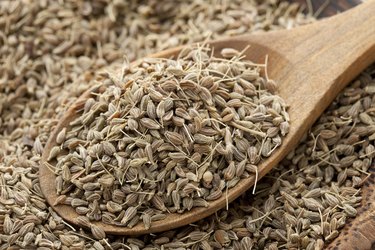
Oil and seeds derived from the anise, or Pimpinella anisum, plant are used as both a cooking spice and medicinal supplement. Traditionally, anise has been used as a digestive aid and cough suppressant and may also help treat intestinal parasites. However, more research is needed to support these purported health effects of anise. Before using this natural treatment, discuss the side effects of anise with your medical provider.
Allergic Skin Reaction
Video of the Day
Used as directed, anise is typically well-tolerated and doesn't cause adverse side effects. Topical preparations of anise may cause mild, allergic skin reactions in certain people. The treated skin site may appear inflamed or red and may begin itching. Seek care from your doctor if skin irritation persists or becomes severe.
Video of the Day
Allergic Digestive and Respiratory Reaction
Orally administered anise supplements may cause moderate to severe allergic reactions of the digestive and respiratory tracts. Such reactions may induce nausea, vomiting, diarrhea, wheezing or shortness of breath. A severe allergy to anise oil may cause pulmonary edema, a life-threatening side effect in which fluid accumulates in the lungs. Ingesting anise oil may also cause seizures in certain people. Anyone who experiences these side effects upon exposure to anise should seek emergency medical care immediately. Left untreated, a severe allergic reaction can be fatal.
Interaction With Other Medications
Anise supplements may interact with certain medications. Avoid taking anise in conjunction with any type of hormone therapy, including estrogen or birth control pills. Anise may mimic the action of estrogen, a hormone, and may reduce the effectiveness of hormone-based therapies. Anise may also reduce the effectiveness of tamoxifen, a drug used to treat certain types of cancer.
Contraindications
Treatment with anise may be inappropriate if you have certain health concerns or problems. Due to its potential estrogen-like effects, people should not use anise if they have hormone-sensitive conditions, including uterine fibroids; endometriosis; or uterine, breast and ovarian cancers. Additionally, it is unknown whether anise is safe to use during pregnancy or breast-feeding.
Is this an emergency? If you are experiencing serious medical symptoms, please see the National Library of Medicine’s list of signs you need emergency medical attention or call 911.